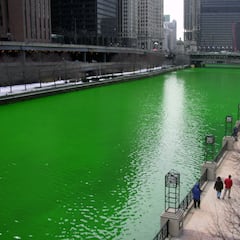St. Patrick’s Day: History, significance, and why It's celebrated on March 17
St. Patrick’s Day is right around the corner, so we took a look at the celebration’s history and origin.


The Chicago river has been dyed green, and many other cities are preparing for St. Paddy’s Day, which will take place on Sunday, 17 March. For those wondering why that date was selected, the US Library of Congress reports that many believe that in 492 AD St. Patrick died on March 17.
Who was St. Patrick?
St. Patrick was born in 385 AD and is known as the ‘Apostle of Ireland.’ Most historians believe that he was born in Roman Brittan or modern-day England.
Some historians trace the history of the holiday to the bringing of Catholicism to Ireland by St. Patrick. At the time that Catholicism was introduced, many on the island followed pagan religions and were allowed to carry on with their customs. This history helps to explain why the holiday is different from other Catholic celebrations.
The origins of St. Patrick’s Day
The holiday in its more modern form became a mainstay in Irish culture as a feast day in the seventeenth century. However, for many years as Irish diasporas grew in other countries, the holiday became much more widely celebrated in those areas, including the United States. Now, cities like Boston, Chicago, New York, and other areas where Irish people landed, host parades and other events to celebrate St. Paddy’s Day. These celebrations took place for decades before those of a similar type were held in the Republic of Ireland.
The first St. Patrick’s Day celebration in Ireland was not held until the late 1990s. It was at this time that the national government of Ireland began to use the day as a way to represent Irish culture and heritage to the rest of the world.
This trend followed in Northern Ireland, which is still a part of the United Kingdom. During “The Troubles” St. Patrick’s Day celebrations had been targets of violence. In 1976, British loyalists deployed a car bomb outside a St. Paddy’s Day gathering which killed four civilians and made many afraid of hosting larger parties and celebrations. However, today communities across Northern Ireland are able to host celebrations that aim to build connections between communities of different faiths and backgrounds.
Wearing green
There are various reasons wearing green became a central part of the holiday, nevertheless, the true origins remain unknown.
Some believe that it relates to Ireland’s nickname, the Emerald Isle as its geography is marked by roiling green hills. Another possibility traces the tradition to the myth that St. Patrick himself carried around a three-leafed clover.
Related stories
Chicago despite its large Irish population, only started an annual parade in 1956, but the city can pat itself on the back. It has been been named the best place to celebrate St Patrick’s Day in the past. Chicago also has the honor of starting the trend of dying rivers emerald green, starting in 1962, to match the color of those celebrating.


Complete your personal details to comment